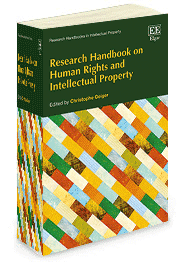Contributors to this volume include Laurence R. Helfer (who edited an earlier Edward Elgar collection of essays, Intellectual Property and Human Rights, published in 2013) and more Katfriends than it would be proper to list here, including a sprinkling of Queen Mary colleagues, the perceptive Philipp von Kapff (OHIM Boards of Appeal), New Zealand scholar Suzy Frankel and the ever-charming neo-Oxonian Dev Gangjee -- whose own volume in this series, on geographical indications, is keenly awaited.
Here's how the publishers describe this tome:
Research Handbook on Human Rights and Intellectual Property is a comprehensive reference work on the intersection of human rights and intellectual property law. Resulting from a field-specific expertise of over 40 scholars and professionals of world renown, the book explores the practical and doctrinal implications of human rights considerations on intellectual property law and jurisprudence.The field under review is a difficult one to address objectively, this Kat feels. People who write about human rights are generally people who believe strongly in their virtues and who like the notion of them being as widely applicable and properly protected as is consonant with civilised life in a well-ordered society: since society is made up of individuals, it is duty-bound to respect them. The effect of this is that, it's not easy to find anyone who writes about human rights because he or she doesn't like them or, in our context, because there exists a strong conviction that they should be subordinate to merely commercial rights. Intellectual property law, in contrast, covers a wider spread of views, from those who research and promote those laws because they passionately believe in them, to those whose interest is stirred by the dangers they pose if they are not properly framed within the parameters of competition policy and enforced within the context of the need to recognise the overriding imperative of human rights protection. This might explain why Professor Geiger's book has drawn on so long a list of distinguished contributors -- and why, in this Kat's opinion, the good professor deserves a decent katpat for all his effort.
The various chapters of the book scrutinize issues related to interactions among and between norms of different legal families and the role of human rights in the development of a balanced intellectual property legal framework. The innovative approach of the book is reflected in its structure: the first part provides a foundation for the human rights and intellectual property discourse; the second sheds light on the human rights implications for the development of intellectual property; and the third (characterised by a human rights perspective) is devoted to the specific issues of interaction between human rights and intellectual property.
Exploring in depth a variety of interactions between human rights and intellectual property law, the book will be of great interest to academics and experts working within human rights, intellectual property, development, international relations and international public law.
Bibliographic data: Publication date April 2015 [though it seems to be published already ...]. xxiv + 727 pages. Hardback ISBN 978 1 78347 241 3; ebook ISBN 978 1 78347 242 0. Price US$295 (online price $265.50). Rupture factor: not to be sneezed at. Book's website here.
Other books in the same series are
- Copyright Law: A Handbook of Contemporary Research (edited by Paul Torremans)
- Trademark Law and Theory: A Handbook of Contemporary Research (edited by Graeme Dinwoodie and Mark D. Janis)
- Patent Law and Theory: A Handbook of Contemporary Research (edited by Toshiko Takenaka)
- Research Handbook on the Future of EU Copyright Law (edited by Estelle Derclaye)
- Law and Theory of Trade Secrecy: a Handbook of Contemporary Research (edited by Rochelle C. Dreyfuss and Katherine J. Strandburg)
- Criminal Enforcement of Intellectual Property: a Handbook of Contemporary Research (edited by Christophe Geiger)
- Research Handbook on Intellectual Property Licensing (edited by Jacques de Werra)
- Research Handbook on Cross-border Enforcement of Intellectual Property (edited by Paul Torremans)
- International Intellectual Property: a Handbook of Contemporary Research (edited by Daniel J. Gervais)
 Reviewed by Jeremy
on
Tuesday, March 03, 2015
Rating:
Reviewed by Jeremy
on
Tuesday, March 03, 2015
Rating:





![[GuestPost] G1/24: Tuning in! A take on the state of proceedings before oral proceedings](https://blogger.googleusercontent.com/img/b/R29vZ2xl/AVvXsEjZhEivE5bp7QOwZsyZXAXbVNYSmLjUthkB2Q7fm1_dpB97u5lIQeyWT9ZadUTAH3Z-hXn13VpW4vBDRPx9emCnoDV6tbUTkyvfmqPv1nNInL8XMdrAtSZ2hcRQr2LjxKovC9wTk_XyZxQ0CtX1MUrO_Muz3OJ4ld8AftymsdUmKD7xNksYMwk6/s72-c/Picture%201.png)


![[Guest book review] The Handbook of Fashion Law (with a discount code)](https://blogger.googleusercontent.com/img/b/R29vZ2xl/AVvXsEgB4h2AdqJKwq9O3Ft4Mb7C39tv_NeFpkzrOfvhIsuwAkM_ops2Hgj7fdwzq_TQsjQDvQrQa-yyC9Q9pNiugseXRlUaMdsr_cmYUbh9lH8HDECMCbsTuNboVgpafyEhkgDkVS6ruHkuz8Sx0QVGI_1S8R9kbsHdNIYrRjqhyphenhyphen010_txjJUYvlZOtWA/s72-c/Fashion%20Law%20Book%20Bicture.jpg)








Bentham: "Natural rights is simple nonsense: natural and imprescriptible rights, rhetorical nonsense — nonsense upon stilts. But this rhetorical nonsense ends in the old strain of mischievous nonsense for immediately a list of these pretended natural rights is given, and those are so expressed as to present to view legal rights. And of these rights, whatever they are, there is not, it seems, any one of which any government can, upon any occasion whatever, abrogate the smallest particle."
ReplyDeleteIs the book up-to-date? Does it have a chapter on human rights in patent offices? Surely, such institutions are part-and-parcel of intellectual property.
ReplyDeleteKind regards,
George Brock-Nannestad